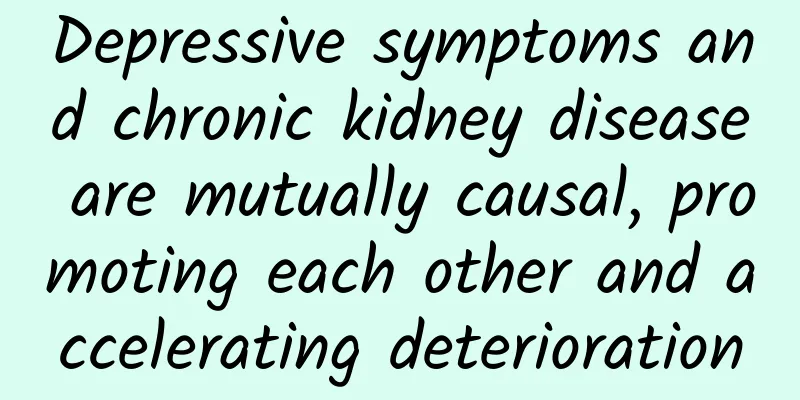Depressive symptoms and chronic kidney disease are mutually causal, promoting each other and accelerating deterioration

|
Chronic kidney disease (CKD) is a major risk factor for cardiovascular disease, renal failure, and death worldwide. In 2012, the overall prevalence of CKD in Chinese adults was 11%, which means that the number of Chinese adult CKD patients is estimated to be approximately 119.5 million. Therefore, identifying more modifiable risk factors to strengthen early detection and primary prevention of CKD has important clinical and public health value. Depression is also a major health problem in China. According to a 2012 national household survey, the prevalence of depressive symptoms among Chinese adults was estimated to be 38%; among the elderly, the prevalence was 53%. At the same time, studies have shown that depressive symptoms are more common in the CKD population. However, no study has systematically evaluated the prospective association between depressive symptoms and CKD. The picture comes from the Internet, the copyright belongs to the original author In response to the above problems, the National Clinical Research Center for Kidney Diseases of Nanfang Hospital and the School of Public Health of Anhui Medical University jointly conducted relevant research and published it in Clinical Journal of the American Society of Nephrology (first author: Zhang Zhuxian) and Journal of Affective Disorders (first author: Liu Mengyi). Studies have shown that in Chinese adults with normal renal function, high depressive symptoms can accelerate the rapid decline of renal function. In a confirmation study of the American population, it was further found that there is a two-way relationship between depression and chronic kidney disease, which promote each other and accelerate deterioration. This article was selected as one of the top five articles selected by CJASN in 2021. The editorial team of CJASN selects five articles for commendation every year, based on the great potential of these studies, which can provide important information for future research, may change current clinical practice, or affect public policy. This series of studies included a total of 4763 participants with normal renal function from the China Health and Retirement Longitudinal Study (CHARLS), and 3731 participants with normal renal function and 2994 participants without depression from the Coronary Artery Risk Development in Youth Study (CARDIA). Depressive symptoms were determined using the 10 indicators of the Depression Self-Rating Scale (CES-D), and a score greater than or equal to 10 was defined as high depressive symptoms. The results showed that in the Chinese population, depressive symptom scores were positively associated with the risk of rapid renal function decline and new-onset CKD. For every 5-point increase in the CES-D score for depressive symptoms, the risk of rapid renal function decline increased significantly by 15% (Figure 1A). Compared with participants with lower depressive symptom scores (CES-D < 10 points), participants with high depressive symptom scores (CES-D ≥ 10 points) had a significant 39% increase in the risk of rapid renal function decline. A similar association was shown between depressive symptom scores and the risk of new-onset CKD (Figure 1B). Figure 1 Relationship between depressive symptoms and rapid decline in renal function (A) and progression to CKD (B) Similarly, among a US population with normal kidney function, participants with high depressive symptom scores had a significantly increased risk of new-onset chronic kidney disease of 28% compared with participants with lower depressive symptom scores. Further analysis showed that among people without depression, the risk of depression in patients with chronic kidney disease was significantly increased by 36% compared with patients without chronic kidney disease. In summary, this series of studies shows that depressive symptoms and chronic kidney disease influence and promote each other. From a clinical perspective, screening for depressive symptoms and effective psychosocial intervention may be important measures for the primary prevention of CKD; at the same time, doctors should pay attention to the potential risk of depression in patients with chronic kidney disease and strengthen psychological comfort and communication. Good emotions are the most powerful force to promote physical health. Learning to perceive and regulate one's own emotions is a very important skill that not only enhances happiness in daily life, but also is beneficial to health. To care about your personal mental health, you might as well try to fill out the following CES-D depression scale according to your actual situation ( special reminder : the two items in the table, whether you are happy or enjoy life , are measured based on negative answers ). CES-D Depression Scale Don't ignore bad emotions and be on guard against the potential threat of depression at any time. The key step is to be able to detect whether your emotional state has turned red in time and actively save yourself, which is crucial for the subsequent response. When you are happy, check the CES-D Depression Scale to see if you are really good; when you are unhappy, check the CES-D Depression Scale to remind yourself to pay more attention to the small happiness and beauty in life and reconcile with yourself. References: [1] Zhang Z, He P, Liu M, Zhou C, Liu C, Li H, Zhang Y, Li Q, Ye Z, Wu Q, Wang G, Liang M, Qin X. Association of Depressive Symptoms with Rapid Kidney Function Decline in Adults with Normal Kidney Function. Clin J Am Soc Nephrol. 2021 Jun;16(6):889-897. [2] Liu M, Zhang Y, Yang S, Wu Q, Ye Z, Zhou C, He P, Zhang Y, Hou FF, Qin X. Bidirectional relations between depression symptoms and chronic kidney disease. J Affect Disord. 2022 Aug 15; 311:224-230. Editor | Zhang Zhuxian, Liu Mengyi, Zhang Yiwei Audit | Qin Xianhui Reprint: Please contact us and indicate the source |
>>: Winter, you are already a ripe orange season!
Recommend
Is it better to stew soft-shelled turtle on low heat or high heat? What kind of heat is better for stewing soft-shelled turtle on high heat?
We all know that there are many ways to cook soft...
How to treat vaginal swelling and pain in women?
Gynecological diseases are a common type of disea...
Is it good for women to drink soy milk every day? How much do you know about soy milk?
Many people like to drink a cup of soy milk for b...
What is the best way to treat follicular dysplasia?
The impact of follicular hypoplasia on women is r...
What is the anterior uterine wall?
During pregnancy, the placenta attaches to a cert...
How to decorate the background wall without ceiling? Decoration design skills of the background wall without ceiling
We all know that there are many options for house...
Are the white spots on the nails really due to calcium deficiency? The nails that really need to be worried are like this...
Rumor: "White spots on the nails mean calciu...
What causes women's thick thighs?
For many women, even if they are not fat, they ar...
Experts recommend preventing myopia: close your eyes for 20 seconds every 20 minutes while reading, and then look into the distance for 20 seconds
Eye health involves the entire life cycle of peop...
Can I get pregnant if I have nephritis?
Chronic nephritis, also known as glomerulonephrit...
Breast tenderness and scanty menstruation
Less menstrual flow and breast pain are common sy...
There are 5 places on a girl's body where hair grows, which is a good thing! Don't shave them!
As the weather gets warmer, many sisters will beg...
GWI: Three reasons why Twitter should not be underestimated
199IT original compilation Twitter has been throu...
What are the dietary methods for women to enhance immunity?
For mature women, they have a menstrual period ev...
What happens if you take too many painkillers? The dangers and side effects of taking painkillers frequently
People often experience various kinds of pain, so...









